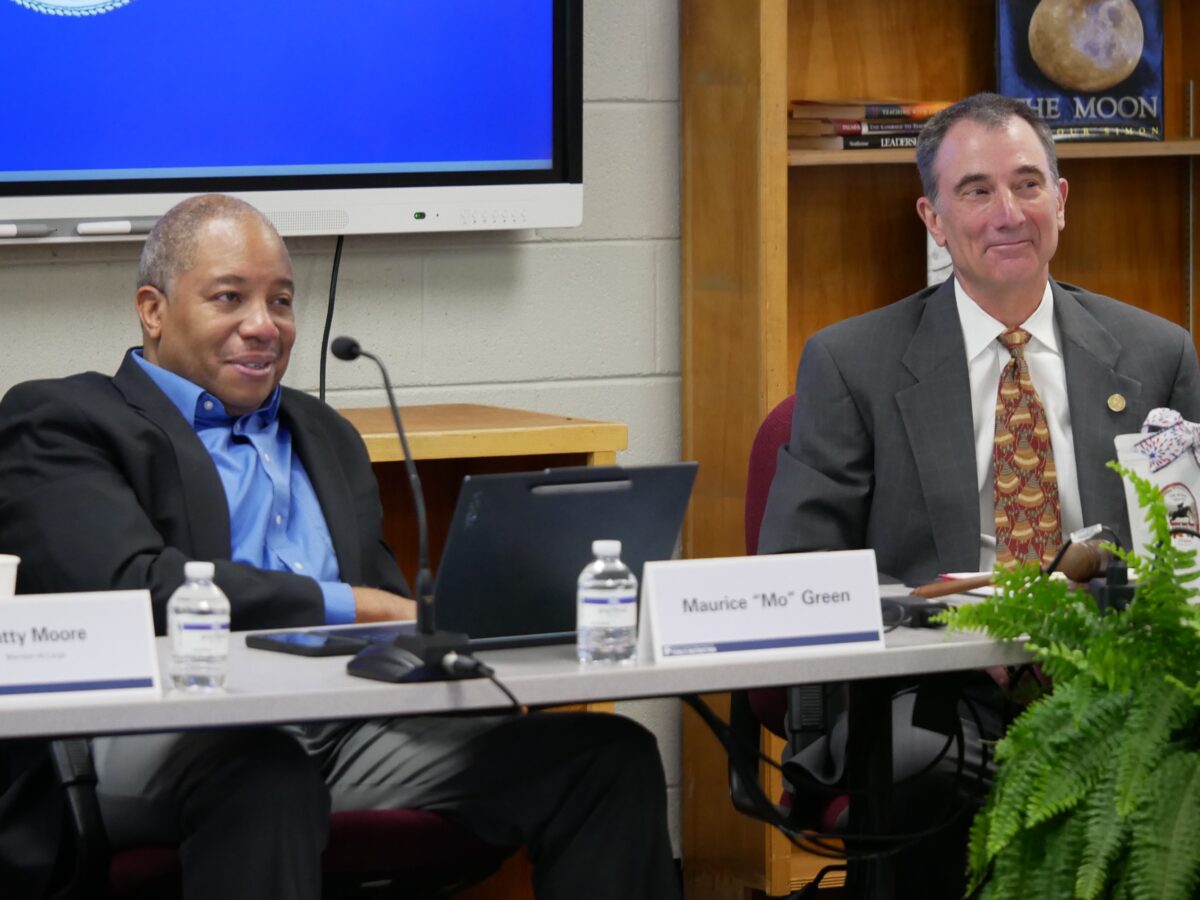
The Department of Public Instruction (DPI) presented new statewide literacy data to the State Board of Education during its meeting on Wednesday.
Seventy percent of first graders were proficient at or above the benchmark for the DIBELS 8 (Dynamic Indicators of Basic Early Literacy Skills 8th Edition) assessment at the end of the 2024-25 school year — the same as the year prior. Second graders saw a one-point increase in proficiency on the assessment, reaching 66%.
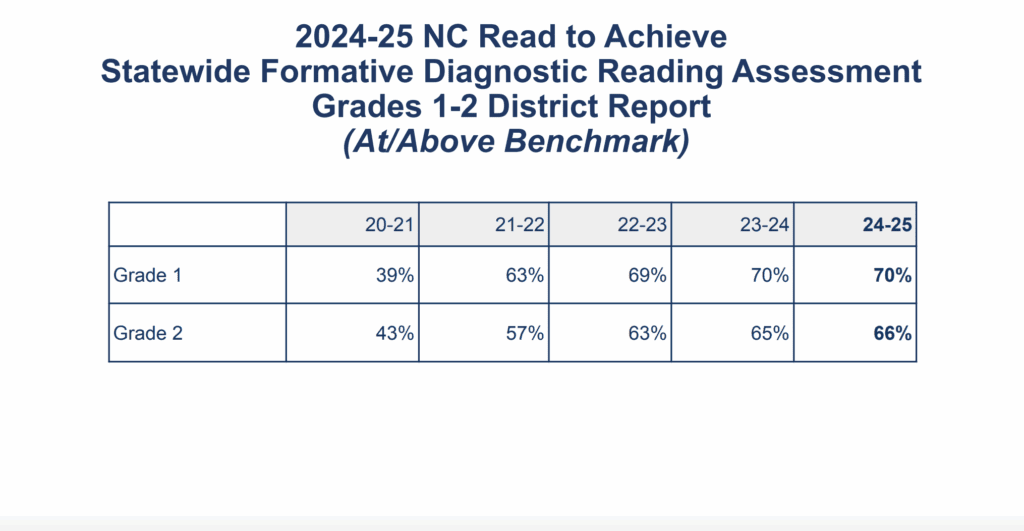
Third graders experienced a two-point drop in reading proficiency — decreasing from 49% to 47% — though third graders who achieved an alternative pathway saw a two-point increase (from 31% to 33%).
First- and second-graders’ scores are based on their performance on the DIBELS 8 assessment. Third graders can pass the beginning-of-grade test, end-of-grade test, or the retest for proficiency. However, these students can also achieve proficiency through an “alternative pathway,” which include DIBELS 8, STAR Reading — the state-approved alternative assessment — or the Read to Achieve test, according to Dan Tetreault, DPI’s assistant director of Early Learning.
“We really need to freeze something around comprehension in grade three, and spend a lot of time in that area with our students so that we begin to see growth — some change in their achievement. And I think it’s buried somewhere in comprehension,” said Board member Dr. Olivia Holmes Oxendine.
![]() Sign up for the EdWeekly, a Friday roundup of the most important education news of the week.
Sign up for the EdWeekly, a Friday roundup of the most important education news of the week.
Districts’ state-mandated reading camp for second graders, which requires 72 hours of reading, saw drops in proficiency relative to the 2023-24 school year. Twenty-nine percent of eligible students participated in the camp, and 11% of participants were deemed proficient after the camp. The previous year, 27% of eligible students joined the camp and 13% achieved proficiency.
Among third-graders, 35% of students were eligible for the camp, of which 23% achieved proficiency. The year prior, 36% were eligible and 22% reached proficiency.
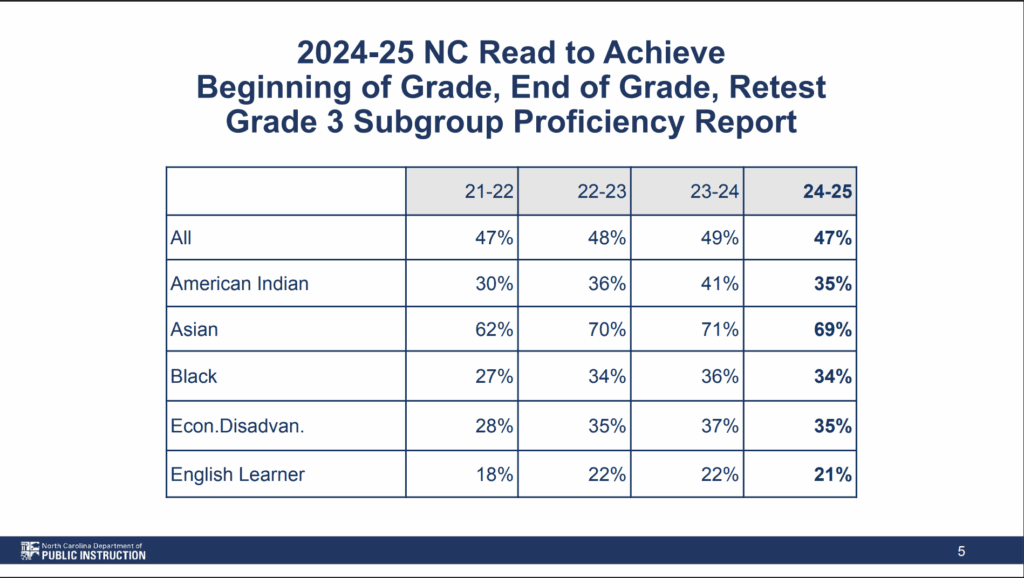
The results reflect the first drop in reading proficiency results for third-graders since science of reading implementation officially began during the 2022-23 school year. Reading proficiency among third graders at the end of that school year was 47%, rose to 49% by 2023-2024, and has now dropped back to 2020-2021 levels.
Tetreault said data from the DIBELS 8 assessment shows strength in students’ acquisition of foundational reading skills, but opportunities for growth in language comprehension.
“Our work moving forward this year is to mobilize our early literacy specialists in each district and through coaching and professional development for teachers, help them to leverage the knowledge they gain through LETRS training around language comprehension, and transfer that knowledge into practice in their classrooms,” Tetreault said, referring to the Language Essentials for Teachers of Reading and Spelling (LETRS) training given to educators as part of the science of reading implementation.
The full presentation is available here and the full report to the General Assembly here.
New school-level accountability task force
Wednesday’s Board meeting began with a proposal to create a task force to develop a new school-level accountability system in line with DPI and the Board’s joint strategic plan.
Dr. Michael Maher, DPI’s chief accountability office, said the state’s current accountability system relies heavily on standardized tests and emphasizes proficiency scores over growth. This system, Maher said, offers a limited picture of students’ readiness for life after graduation.
In North Carolina, school grades are based on each school’s achievement score (including standardized test grades), weighted 80%, and on students’ academic growth, weighted 20%. Education leaders have long said that formula does not capture the full picture of the work happening in the state’s public schools.
Over the last few years, and under the leadership of former state Superintendent Catherine Truitt, DPI advocated for state lawmakers to change how school performance grades are calculated to account for more factors than achievement and growth. While lawmakers initially showed interest in DPI and Truitt’s plan, they never passed legislation changing the formula. The creation of a task force this week reflects another attempt by DPI to reform school performance grades.
The new task force would identify “valid and reliable” measures across all grades — as opposed to the current system, which covers grades 3-12. A new system would focus on students’ readiness beyond graduation, recognize growth and equality of opportunity for students, and offer transparent reporting for parents, educators, and communities, Maher said.
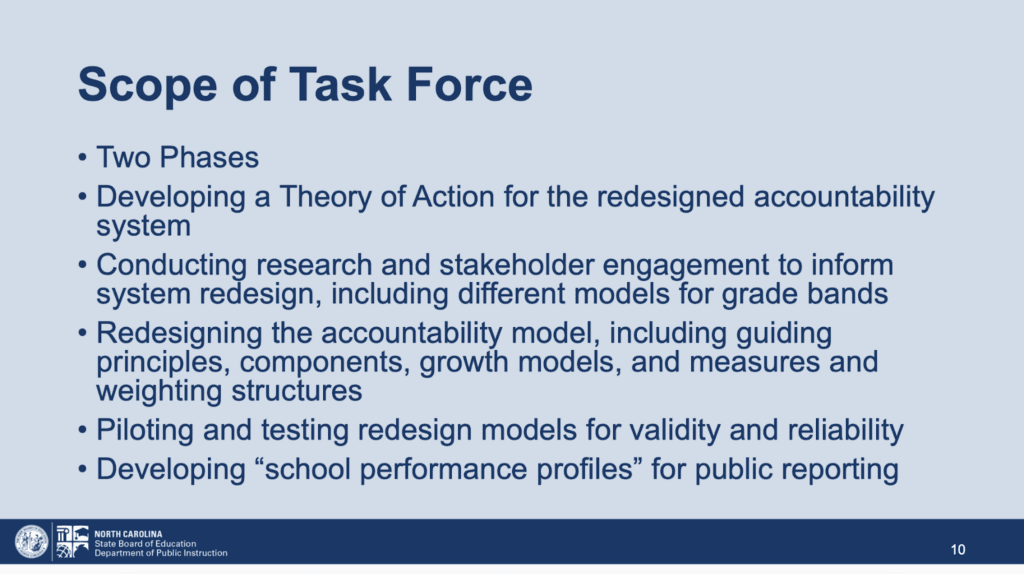
The task force would convene in November for the first time and deliver a draft framework next summer. Any proposal adopted by DPI and the State Board would need legislative approval to be implemented.
“I believe we can all agree that our accountability system merits improvement,” Board Chair Eric Davis said after approving the task force’s formation at Thursday’s meeting. “For example, the current model distracts us from our ultimate mission to understand what we’re successfully teaching, what learning is not occurring, and how to get better.”
Read more
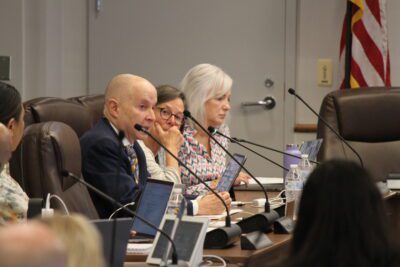
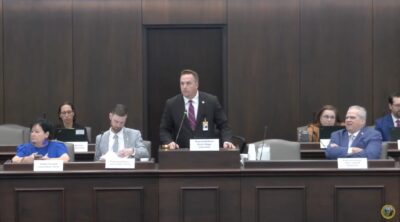
On Wednesday, Dr. Don Phipps, president of the North Carolina School Superintendents’ Association (NCSSA), read a statement to the Board expressing superintendents’ endorsement of the Board’s new five-year strategic plan.
“We welcome this comprehensive plan which supports all educators and students in the pursuit of excellence across all eight strategic pillars,” the statement reads. “NCASA is committed to efforts that elevate our public school educators and strengthen family and community partnerships.”
Phipps also announced a partnership with coaching company FranklinCovey to provide leadership coaching to 15 districts with first- and second-year superintendents over the next two school years. These superintendents, their district leadership team, and principals will participate in two of these professional development workshops, he said.
Reports to the General Assembly
Low-Performing Districts and Schools
The number of low-performing schools decreased by 50 schools, according to the annual Low-Performing Districts and Schools, Improvement Planning and Statewide Support report presented to the Board. In North Carolina, low-performing schools are those that have earned a performance grade of D or F and growth scores showing they either met or failed to meet expected growth.
The report said North Carolina has 686 low-performing traditional schools and 53 low-performing charter schools with a state low-performing designation. Twenty-three districts have a low-performing district designation. The highest concentrations of low-performing schools were in the Piedmont-Triad (142 schools) and North Central (109 schools) regions of the state.
The report’s presentation also featured legislative recommendations based on a survey of superintendents with low-performing schools. The survey’s top findings included calls to reform the state accountability model.
“A redesigned model, according to the survey, should balance proficiency and growth, ensure that schools meet and growth are recognized for that achievement, and incorporate measures that more accurately capture teaching and learning, particularly at the high school level,” said Dr. Cynthia Martin, director of school transformation at the Office of District & School Support Services.
Superintendents will have to respond to an individualized survey with their decisions to retain, retain with a plan, transfer, or demote principals of low-performing schools by the end of October. The survey is being administered by DPI for the second year to respond to a legislative requirement, Martin said.
Teacher bonus program study and report
The Board received a presentation on a report required by the General Assembly to determine the effects of bonuses on teachers’ performance and retention.
The report could only offer data that was “descriptive in nature” and correlational analyses, however, without being able to find causal relationships between bonuses and teacher effectiveness or retention, according to the report. This was due to the methodologies prescribed for the study by the General Assembly, said Sneha Shah-Coltrane, senior director of Advanced Learning and Gifted Education at DPI.
Teachers who earned growth-based teacher bonuses in prior years were more likely to receive bonuses in 2025, said Beth Cross, assistant director of Advanced Learning and Gifted Education in her presentation. The report also concluded that bonuses have continued to expand and reach substantial numbers of teachers. Among these bonuses, CTE (Career and Technical Education) and AP (Advanced Placement) bonuses are reaching more educators and reaching “markedly higher total dollars,” Cross said.
Policies and procedures of Parents’ Bill of Rights
The Parents’ Bill of Rights, enacted in 2023, provided parents with the opportunity to review curriculums and required schools to adopt procedures allowing parents to notify principals about their concerns regarding school curriculum. The bill also requires public schools to report on their compliance annually.
According to a report presented to the Board, all 115 school districts and 198 charter and lab schools submitted reports. These reports revealed that 98% of public schools had no appeals, 93% had no statements to parents, 97% had no parental hearings, and 99% had no actions or judgments.
Read more
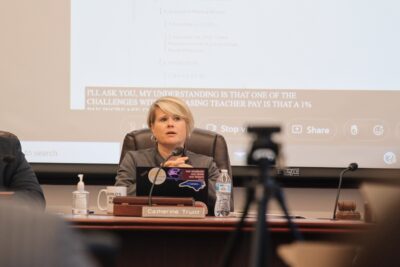

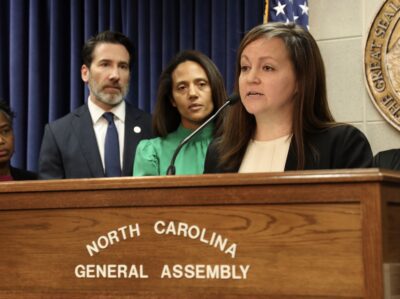
Legislative update, remote academies, and more
Final school performance data
Following DPI’s presentation of school performance data in September, schools were allowed to submit data corrections. Dr. Tammy Howard, senior director of the Office of Accountability and Testing, presented the 29 data corrections submitted to DPI, which resulted in five schools changing their school performance grade.
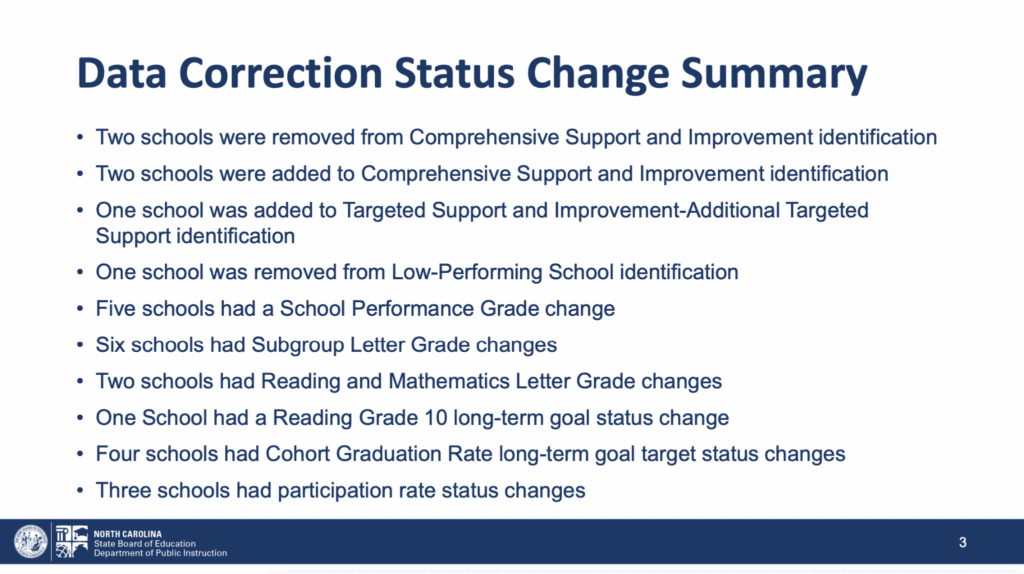
Remote academies
Maher presented a draft report summarizing 39 remote academies’ enrollment and performance data. The report found academies with a higher percentage of economically disadvantaged students had lower school performance grades — though Maher said this was based on a small data sample.
Most remote high schools reported very low dropout rates, though some had rates above the state average, Maher said. He said this is the first report of its kind, so it should serve as a baseline for future analysis.
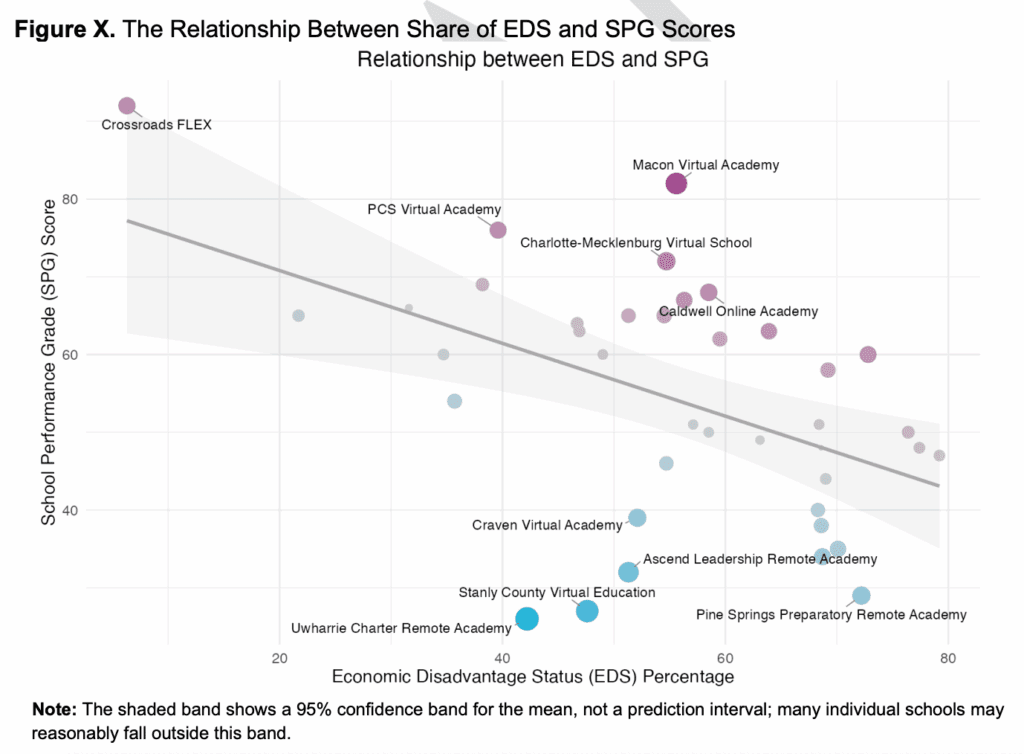
Council on Educational Services for Exceptional Children report
Peyton Davis, chair of the Council on Educational Services for Exceptional Children, said addressing the unmet needs of children with disabilities continues to be a challenge due to the state’s current funding model. Though school districts receive additional funding for exceptional children, that amount is capped at 13% of the student population.
“The current funding framework does not fully accommodate the nuanced demands of special education services,” Davis said while presenting her council’s annual report.
The council has collaborated with DPI’s Office of Exceptional Children to revise a required parent survey and encourage participation in the survey. The council also sent a letter of support for a proposed EC weighted funding model to the State Board of Education and the NCDPI Office of Government Affairs and Strategy.
Charter school transcripts
The Board discussed an amendment to the transcript system which was first presented in June.
DPI is required by law to host a system for standardized transcripts, which must include class rank. However, this legislation does not apply to charter schools, so DPI was not legally required to use standardized transcripts for these schools. Additionally, charter schools do not have to include class rank on official transcripts.
Previous iterations of DPI’s system, the Student Information System, did not allow DPI to produce transcripts without class rank for charter schools, said Rupen Fofaria, director of Board Operations and Policy Office. That system also did not automatically include charter schools, which could exclude them from enrollment in NC College Connect, the program providing direct college admission to many higher education institutions across the state.
This amendment says charter schools can use the updated transcript system, which now allows schools to generate a transcript that hides class rank, or a transcript of their own design. Additionally, when charter schools input GPA data, students’ information will be captured for the purposes of NC College Connect.
Multiple Board members expressed the desire for traditional public schools to be able to exclude class rank information from their transcripts in the future. Ultimately, the Board unanimously voted to ask lawmakers to give traditional public high schools the same flexibility currently given to charter schools.
Legislative updates
Geoff Coltrane, senior director of government affairs and strategy for the state superintendent, provided a legislative update following the General Assembly’s activity last week.
Two bills that have since become law directly affect K-12 schools. House Bill 358 expands funding for three new cooperative innovative high schools (CIHS) in Charlotte-Mecklenburg, Martin, and Moore counties. It also ensures funding support for four virtual high schools and two small specialty schools.
The Regulatory Reform Act of 2025, House Bill 926, gives the Board the authority to provide K-3 class size waivers to schools in districts that are implementing the advanced teaching roles grant program.
Coltrane also highlighted House Bill 775, which passed the House on Sept. 23 and is under consideration in the Senate. That bill codifies the requirement to conduct criminal background checks for all new public school employees. It also expands the definition of educator misconduct to cover “the intentional infliction of emotional distress on a child.”
Board members also received an update on the federal government shutdown that began Wednesday.
Alexis Schauss, DPI’s chief financial officer, said immediate disruptions are unlikely given that most of the state’s federal education grants are forward-funded. Reimbursement programs, such as the National School Lunch Program, could be strained if the shutdown is prolonged.
“But in the immediate short term, we do not have concerns on the continuing operations of that program,” Schauss said.
The full Board meets next Nov. 4-6.
Recommended reading



